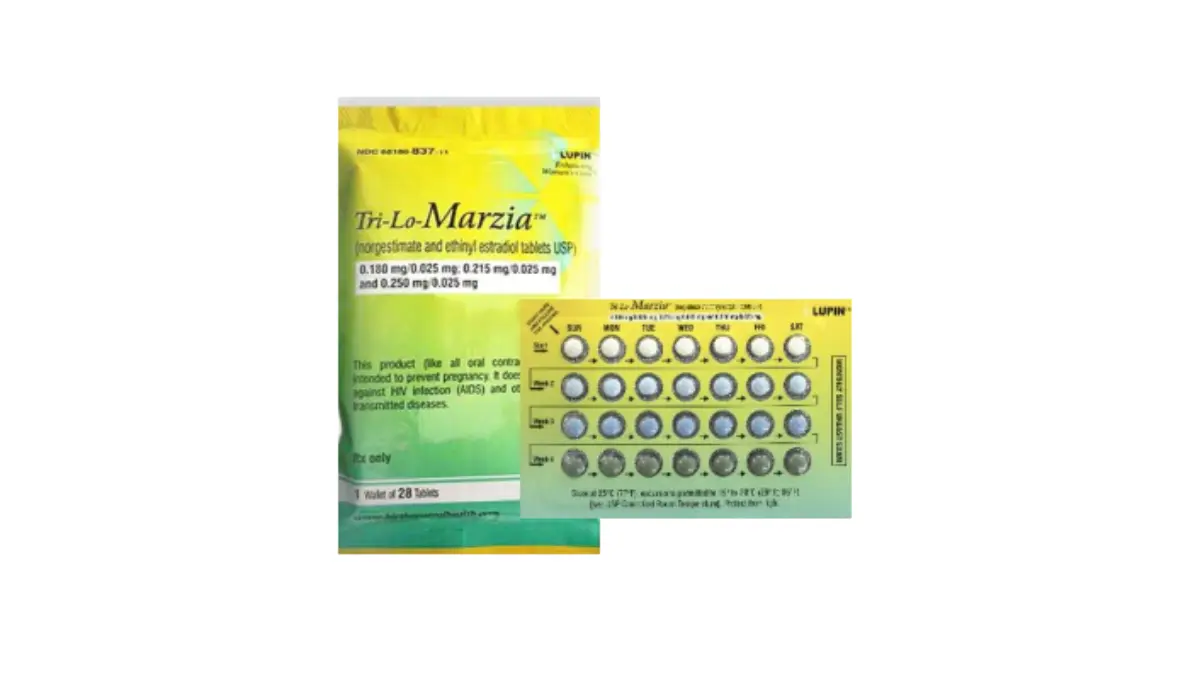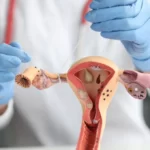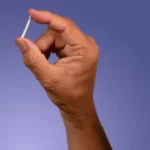
In a world where reproductive health is gaining attention, understanding the various options for birth control is essential for anyone looking to take charge of their fertility. One such method that has been the subject of much discussion is Tri-Lo-Marzia. This comprehensive guide aims to shed light on this specific birth control pill, helping readers understand its mechanism, benefits, potential side effects, and much more.
Related: Junel Fe Birth Control: Your Life, Your Control
What is Tri-Lo-Marzia Birth Control?

Tri-Lo-Marzia Birth Control manufactured by Lupin Pharmaceuticals, Inc. is a combination hormone medication designed to prevent pregnancy, containing two primary hormones: a progestin and an estrogen. These hormones prevent ovulation, meaning they stop the ovaries from releasing eggs. Additionally, Tri-Lo-Marzia induces changes in the cervical mucus and uterine lining, creating an environment that’s less favorable for sperm reaching the uterus and for any potentially fertilized eggs attaching to the uterus.
Apart from its primary role in preventing pregnancy, Tri-Lo-Marzia offers several side benefits. It can regulate menstrual cycles, reduce the intensity and duration of periods, decrease the risk of developing ovarian cysts, and help in treating acne. However, it’s important to note that while it addresses several reproductive health issues, Tri-Lo-Marzia does not offer protection against sexually transmitted diseases (STDs) like HIV, gonorrhea, or chlamydia.
Related: Hailey 24 Fe Birth Control Pills: End Period Woes!
What is the most important information I should know about Tri-Lo-Marzia?
The most important information you should know about Tri-Lo-Marzia is that you should not use it if you smoke cigarettes and are over 35 years old. Smoking increases your risk of serious cardiovascular side effects from hormonal birth control pills, including death from heart attack, blood clots, or stroke. This risk increases with age and the number of cigarettes you smoke.
Related: Yaz Birth Control | In-Depth Guide (2023)
How does the Tri-Lo-Marzia birth control pill work?
The Tri-Lo-Marzia birth control pill works through a combination of mechanisms brought about by its hormonal components, which are a form of progestin and estrogen. Here’s how these mechanisms function:
- Prevention of Ovulation: The primary action of Tri-Lo-Marzia is to prevent the ovaries from releasing an egg, a process known as ovulation. If no egg is released, fertilization cannot occur, regardless of the presence of sperm.
- Alteration of Cervical Mucus: The hormones in Tri-Lo-Marzia cause the mucus at the entrance of the uterus (the cervix) to thicken. This thickened cervical mucus acts as a barrier, making it significantly more difficult for sperm to enter the uterus and reach any egg that might have been released.
- Modification of the Uterine Lining: Tri-Lo-Marzia affects the lining of the uterus (endometrium), making it less receptive to an egg. Even if an egg does get fertilized by a sperm, the altered endometrial environment reduces the likelihood of the fertilized egg attaching itself to the uterine wall (implantation).
Related: Mirena IUD: Birth Control That Also Helps With Heavy Periods
How is Tri-Lo-Marzia Birth Control used?
Tri-Lo-Marzia Birth Control is used as follows:
- Consistent Daily Use: Take one pill every day at the same consistent time. Follow the specific order of pills as directed on the blister pack.
- Avoid Skipping Pills: Do not skip pills, regardless of the frequency of sexual activity. Skipping pills increases the risk of pregnancy, especially if multiple pills are missed.
- Dealing with Forgetfulness: If you have trouble remembering to take the pill, consult your healthcare provider. Spotting or light bleeding may occur initially but contact your provider if it persists for several months.
- Nausea Management: Nausea is possible, especially in the first few months. Do not stop taking the pill if you experience this. If nausea persists, contact your healthcare provider.
- Missed Pills: If you miss pills, you may experience spotting or light bleeding. You should take the missed pills even if it means taking two pills in one day. If you miss a period, took the pills irregularly, miss two periods in a row, or suspect pregnancy, contact your healthcare provider immediately.
- Vomiting or Diarrhea: If you vomit or have diarrhea within 3 to 4 hours of taking your pill, take another pill from an extra blister pack. If you don’t have an extra pack, continue with the next pill in your current pack and adjust your schedule accordingly. If vomiting or diarrhea persists for more than a day, the effectiveness of the pills may be compromised, and additional birth control methods should be used.
- Before and After Surgery: Stop taking Tri-Lo-Marzia at least four weeks before major surgery and do not restart it without your healthcare provider’s approval. Use alternative contraception methods during this period.
- Regular Communication with Healthcare Provider: Maintain regular contact with your healthcare provider to discuss any side effects or concerns and to determine when it is safe to resume use after surgery or health issues.
Related: Marlissa Birth Control: An In-Depth Review of a Popular Contraceptive Option
What should someone do if they miss a dose?
If someone misses a dose of Tri-Lo-Marzia, the actions they should take depend on how many pills they have missed and when they missed them. Here’s what to do:
- If you miss 1 pill in Weeks 1, 2, or 3:
- Take the missed pill as soon as you remember.
- Take the next pill at your regular time, which may mean taking two pills in one day.
- Continue taking 1 pill every day until you finish the pack.
- There is no need to use a back-up birth control method if you have sex.
- If you miss 2 pills in Week 1 or Week 2:
- Take the two missed pills as soon as possible and the next two pills the following day.
- Continue to take 1 pill every day until you finish the pack.
- Use a non-hormonal birth control method (such as a condom and spermicide) as a back-up if you have sex during the first 7 days after missing your pills.
- If you miss 2 pills in a row in Week 3, or miss 3 or more pills in a row during Weeks 1, 2, or 3:
- For Day 1 Starters:
- Discard the rest of the pill pack and start a new pack that same day.
- You may not have your period this month, which is expected. However, if you miss your period for two months in a row, call your healthcare provider as you might be pregnant.
- You could become pregnant if you have sex in the first 7 days after you restart your pills. You MUST use a non-hormonal birth control method (such as a condom and spermicide) as a back-up during those 7 days.
- For Sunday Starters:
- Continue taking one pill every day until Sunday. On Sunday, discard the rest of the pack and start a new pack that same day.
- Use a non-hormonal birth control method (such as a condom and spermicide) as a back-up if you have sex during the first 7 days after you restart your pills.
- For Day 1 Starters:
Related: Weight Gain after Stopping Birth Control
what precautions to take before taking Tri-Lo-Marzia?
Before taking Tri-Lo-Marzia, it’s crucial to take certain precautions to ensure your safety and the medication’s effectiveness. Here’s what you need to consider:
- Allergies: Inform your doctor or pharmacist if you have any allergies, especially to estrogens (e.g., ethinyl estradiol, mestranol) or progestins (e.g., norethindrone, desogestrel), as well as any other allergies. Since this product may contain inactive ingredients that can cause allergic reactions or other issues, your healthcare provider needs this information.
- Medical History: Share your complete medical history with your doctor, particularly if it includes:
- Blood clots or clotting disorders.
- High blood pressure.
- Abnormal breast exams, cancer (especially endometrial or breast cancer).
- High cholesterol or triglyceride levels.
- Depression, diabetes, or a family/personal history of a swelling disorder (angioedema).
- Gallbladder problems, severe headaches/migraines, heart problems.
- History of yellowing eyes/skin (jaundice) during pregnancy or hormonal birth control use.
- Kidney or liver disease (including tumors), obesity, stroke, swelling (edema), thyroid problems.
- Unexplained vaginal bleeding.
- Blood Sugar Monitoring: If you have diabetes, this medication might affect your blood sugar levels. Monitor your blood sugar regularly, and share the results with your doctor. Be vigilant for symptoms of high blood sugar, including increased thirst/urination.
- Dietary Restrictions: If the tablets are chewable, they may contain sugar or aspartame. If you have conditions like diabetes or phenylketonuria (PKU) requiring dietary restrictions, exercise caution.
- Surgery or Prolonged Immobility: Inform your doctor if you’re scheduled for surgery or will be confined to a bed or chair for an extended period (e.g., long plane flight). These situations increase your risk of blood clots, and you may need to temporarily stop the medication or take additional precautions.
- Sun Sensitivity: This medication might cause blotchy, dark areas on your skin (melasma). Limit sun exposure and use sunscreen and protective clothing to prevent this effect.
- Vision Concerns: If you’re nearsighted or wear contact lenses, be aware of potential vision changes. Contact your eye doctor if you experience any issues.
- Pregnancy and Breastfeeding: This medication should not be used during pregnancy. If you become pregnant, inform your doctor immediately. After giving birth or experiencing a pregnancy loss/abortion, discuss when you can safely resume using hormonal birth control. Be aware that this medication may reduce breast milk production and can affect a nursing infant.
Related: Acne after Stopping Birth Control
How does Tri-Lo-Marzia interact with other medications?
Tri-Lo-Marzia can interact with other medications, potentially altering their effects or increasing your risk for serious side effects. Here’s what you need to know about these interactions:
- Maintain a Current List of Medications: Keep a comprehensive list of all the products you use, including prescription and non-prescription drugs, as well as herbal products. Share this list with your doctor and pharmacist to check for potential interactions.
- Specific Drug Interactions: Certain products may interact with Tri-Lo-Marzia, including:
- Aromatase inhibitors (e.g., anastrozole, exemestane)
- Fezolinetant
- Ospemifene
- Tamoxifen
- Tizanidine
- Tranexamic acid
- Certain combination products used to treat chronic hepatitis C (e.g., ombitasvir/paritaprevir/ritonavir with or without dasabuvir)
- Effect on Hormonal Birth Control: Some drugs can decrease the effectiveness of hormonal birth control by reducing the amount of birth control hormones in your body, potentially leading to pregnancy. These include:
- Griseofulvin
- Modafinil
- Rifamycins (e.g., rifampin, rifabutin)
- Ritonavir
- St. John’s wort
- Drugs used to treat seizures (e.g., barbiturates, carbamazepine, felbamate, phenytoin, primidone, topiramate)
- HIV drugs (e.g., nelfinavir, nevirapine)
- Additional Birth Control: If you start any new drug, discuss with your doctor whether you need to use additional reliable birth control methods. Also, report any spotting or breakthrough bleeding, as these could indicate that your birth control is not working effectively.
- Lab Interferences: Tri-Lo-Marzia may interfere with certain laboratory tests (such as blood clotting factors, thyroid tests), potentially causing false test results. Inform lab personnel and all your doctors that you are using this medication.
Related: What are the Chances of Getting Pregnant after Stopping Birth Control?
How safe is Tri-Lo-Marzia birth control pill?
Tri-Lo-Marzia birth control pills are generally considered safe for most women but come with potential risks, especially for those with certain health conditions like a history of blood clots or heart disease. Common side effects can include nausea, breast tenderness, or weight changes, while more severe risks involve blood clots, stroke, or heart attack. Its effectiveness in preventing pregnancy is high when taken as directed. However, individual experiences with the medication can vary, and it’s crucial to discuss personal medical history and lifestyle factors with a healthcare provider before use. Regular medical monitoring is also recommended while on this medication.
What are possible side effects of Tri-Lo-Marzia?
Tri-Lo-Marzia, like other hormonal contraceptives, can cause side effects. Some of these side effects can be serious, while others are more common and may not be as severe. Here’s a breakdown:
Serious Side Effects: These are potentially life-threatening and require immediate medical attention. They include:
- Blood clots: These can occur in various parts of the body, including the lungs, heart, legs, or eyes, potentially leading to heart attacks, strokes, or other serious conditions.
- Liver problems: Rare instances of liver tumors and jaundice, particularly if there’s a history of cholestasis of pregnancy.
- High blood pressure: Regular monitoring is advised.
- Gallbladder problems
- Changes in blood sugar and fat levels: This refers to alterations in cholesterol and triglycerides.
- Severe headaches or migraines
- Irregular vaginal bleeding or spotting: Especially during the first three months.
- Depression
- Potential cancer risk: Increased risk in the breast and cervix.
- Swelling of the skin (angioedema): Particularly around the mouth, eyes, and throat.
- Skin changes: Dark patches on the skin (chloasma), especially for those who are pregnant or have a predisposition to it.
Symptoms requiring immediate attention include:
- Persistent leg pain
- Sudden shortness of breath
- Changes in vision or blindness
- Unexplained chest pain
- Severe headaches
- Weakness or numbness in limbs
- Difficulty speaking
Common Side Effects: These are not usually life-threatening but can cause discomfort. They include:
- Headaches (including migraines)
- Nausea and vomiting
- Breast issues: Tenderness, pain, discomfort, enlargement, swelling, discharge, or nipple pain.
- Stomach pain
- Menstrual pain
- Mood changes (including depression)
- Acne
- Vaginal infections
- Bloating
- Weight gain
- Fatigue
These lists do not encompass all the possible side effects. It’s important for individuals taking Tri-Lo-Marzia to maintain open communication with their healthcare providers and report any side effects. They can also report side effects to the FDA at 1-800-FDA-1088 or Lupin Pharmaceuticals, Inc. at 1-800-399-2561.
Does hormonal birth control cause cancer?
The relationship between hormonal birth control and cancer is not definitively understood. While it is not confirmed that hormonal birth control pills cause breast cancer, some studies suggest a slight increase in the risk among long-term users, though this is not universally agreed upon in research.
Individuals with a current or past diagnosis of breast cancer should avoid hormonal contraceptives, as some breast cancers are hormone-sensitive, and exposure to external hormones could potentially stimulate cancer growth.
Additionally, there is a slightly elevated risk of cervical cancer in women who use birth control pills. However, this increase may not be solely due to the contraception itself but potentially linked to other factors, including having more sexual partners. The nuanced nature of these risks underscores the importance of discussing personal health history and lifestyle with a healthcare provider when considering hormonal birth control options.
How to store and handle Tri-Lo-Marzia Birth Control?
To store and handle Tri-Lo-Marzia Birth Control properly, you should adhere to the following guidelines:
- Temperature: Store the pills at room temperature, specifically between 68° to 77°F (20° to 25°C). This range helps to maintain the medication’s effectiveness.
- Child Safety: Keep Tri-Lo-Marzia, as well as all other medications, out of the reach of children. This precaution is crucial to prevent accidental ingestion or misuse by children.
- Light Exposure: Store the medication away from light. Excessive light exposure can degrade the medication, potentially reducing its effectiveness.
Where can one get Tri-Lo-Marzia Birth Control?
Here are some places where you can get Tri-Lo-Marzia birth control:
- Nurx: This is an online platform that provides safe, private, and affordable birth control prescriptions. You can buy Tri-Lo-Marzia birth control online and get free delivery.
- Pandia Health: This is another online platform that provides birth control prescriptions. You can buy Tri-Lo-Marzia birth control pills online with free delivery. Pandia Health has licensed doctors in every state they operate in.
- Amazon Pharmacy: You can buy Tri-Lo-Marzia 28-day pack online from Amazon Pharmacy. It requires a prescription from a doctor.
- Blink Health: This is an online platform that offers Tri-Lo-Marzia birth control pills at a discounted price. You can buy Tri-Lo-Marzia (norgestimate ethinyl estradiol) online from Blink Health.
- Local pharmacies: Tri-Lo-Marzia should be available at most pharmacies in your area including GoodRx. However, it requires a prescription from a doctor.
It is important to note that Tri-Lo-Marzia is a prescription medication and should only be taken under the guidance of a healthcare provider.
what are Tri-Lo-Marzia pill alternatives?
Here are some alternatives to Tri-Lo-Marzia birth control pills:
- Lo Loestrin Fe: This is a low-dose birth control pill that contains a combination of ethinyl estradiol and norethindrone acetate. It is also used to prevent pregnancy and has a similar mechanism of action to Tri-Lo-Marzia.
- Sprintec: This is another combination birth control pill that contains ethinyl estradiol and norgestimate. It is used to prevent pregnancy and has a similar mechanism of action to Tri-Lo-Marzia.
- Yaz: This is a birth control pill that contains a combination of ethinyl estradiol and drospirenone. It is used to prevent pregnancy and has a similar mechanism of action to Tri-Lo-Marzia.
- Mirena: This is a hormonal intrauterine device (IUD) that contains levonorgestrel. It is a long-acting reversible contraceptive (LARC) and provides effective birth control for up to 5 years.
- Nexplanon: This is a hormonal implant that contains etonogestrel. It is a LARC and provides effective birth control for up to 3 years.
- Estarylla: This is a combination birth control pill that contains ethinyl estradiol and norgestimate. It is used to prevent pregnancy and has a similar mechanism of action to Tri-Lo-Marzia.
- Mili: This is a combination birth control pill that contains ethinyl estradiol and norgestimate. It is used to prevent pregnancy and has a similar mechanism of action to Tri-Lo-Marzia.
what is the difference between Tri-Lo-Marzia and Ortho Tri-Cyclen Lo?
Tri-Lo-Marzia and Ortho Tri-Cyclen Lo are both birth control pills that contain the same active ingredients, norgestimate and ethinyl estradiol. However, there are some differences between the two:Differences in dosage:
- Tri-Lo-Marzia has four different strengths of pills in each pack, while Ortho Tri-Cyclen Lo has three different strengths.
- Tri-Lo-Marzia has a lower dose of ethinyl estradiol in the first seven pills of each pack compared to Ortho Tri-Cyclen Lo.
Differences in indications:
- Tri-Lo-Marzia is indicated for the prevention of pregnancy, while Ortho Tri-Cyclen Lo is also indicated for the treatment of moderate acne vulgaris in females at least 15 years of age.
Differences in side effects:
- Both Tri-Lo-Marzia and Ortho Tri-Cyclen Lo have similar side effects, such as nausea, vomiting, headache, breast tenderness, and breakthrough bleeding. However, the incidence and severity of these side effects may vary between individuals.
What are some User reviews about Tri-Lo-Marzia?
User reviews for Tri-Lo-Marzia Birth Control on WebMD indicate a mix of experiences, ranging from positive to negative. Here’s a summary based on various user experiences:
Positive Reviews:
- Many users have found Tri-Lo-Marzia effective as a birth control method, with some having used it for several years without experiencing significant side effects.
- Some users reported additional benefits such as lighter periods and reduced acne.
- One user mentioned not experiencing the negative side effects often associated with birth control pills, which they had been warned about by others.
Example: A reviewer expressed satisfaction with Tri-Lo-Marzia, stating that despite warnings from friends about severe side effects from birth control, they experienced none. They’ve been punctual in taking the pill and have had no pregnancy scares, recommending Tri-Lo-Marzia based on their positive experience.
Negative Reviews:
- However, some users have experienced adverse side effects, including mood swings, weight gain, bloating, and emotional distress.
- A few reviewers specifically mentioned experiencing severe mood changes, including depression and heightened emotional sensitivity, leading to a decrease in overall life satisfaction.
- Concerns were also raised about physical side effects such as increased bloating to the point of discomfort and clothes not fitting well.
Example: One user reported a drastic change in their mood, stating that the medication altered their personality and emotional state. They experienced intense sadness and crying spells, which was atypical for them, indicating that the birth control may have exacerbated depression and emotional instability.
Neutral and Mixed Reviews:
- Some users have had neutral to mixed experiences, where they acknowledged the effectiveness of the birth control in preventing pregnancy but were less satisfied with the side effects.
- These side effects included unpredictable mood swings, changes in menstrual cycles, and in some cases, physical discomfort.
Example: A user cited effectiveness in pain reduction during periods and birth control but experienced negative emotional side effects, including mood swings and paranoia, leading them to prefer dealing with menstrual discomfort over continuing with the pill.
Conclusion
Tri-Lo-Marzia represents a reliable option for women seeking birth control methods, offering various benefits beyond contraception. While it may not be suitable for everyone, understanding its workings, pros, and cons can help individuals make informed decisions about their reproductive health. As with any medication, a healthcare professional’s guidance is crucial to navigate its use safely and effectively.












